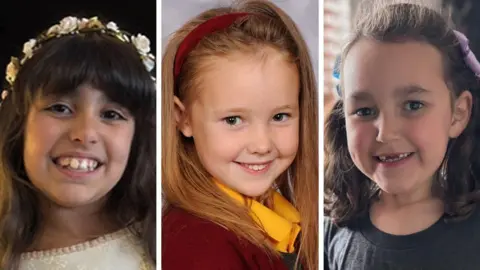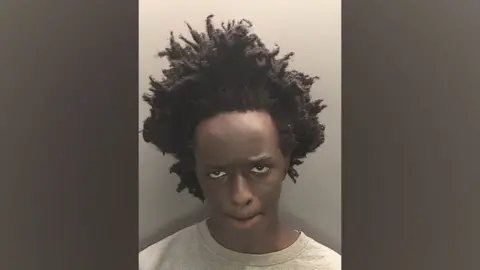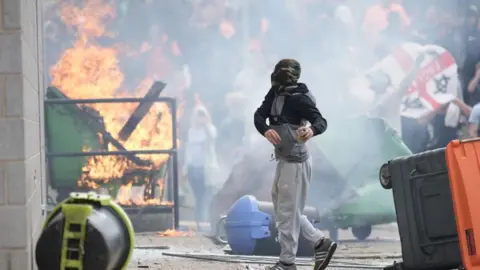'Terrorism has changed', says PM on Southport attacks
 PA/Merseyside Police
PA/Merseyside Police"Terrorism has changed" as Britain faces a "new and dangerous threat" from extreme violence, Sir Keir Starmer has said in a statement on the Southport murders.
Speaking in Downing Street after the government announced a public inquiry into the case, the prime minister said failings by the state "leap off the page".
Axel Rudakubana had been referred three times to anti-extremism programme Prevent before killing Bebe King, six, Elsie Dot Stancombe, seven, and nine-year-old Alice da Silva Aguiar last July.
Sir Keir said if the law needed to change, it would - as he denied there had been any cover-up over the background in the case.
He said a review would be carried out into "our entire counter-extremist system", adding that he had asked cross-bench peer Lord Anderson of Ipswich KC - the new independent Prevent commissioner - "to hold this system to account, to shine a light into its darkest corners".
The prime minister said in the past the predominant threat was highly-organised groups such as al-Qaeda, but warned the new threat was acts of extreme violence by "loners, misfits, young men in their bedroom" accessing material online.
Home Secretary Yvette Cooper said the inquiry into Rudakubana would also "consider the wider challenge of rising youth violence and extremism".
In a House of Commons statement, she said 162 people were referred to Prevent last year for concerns relating to school massacres.
Cooper said Rudakubana had been "easily able" to order a knife from Amazon despite having a previous conviction for violence and being aged 17 at the time. She also revealed he had admitted to having carried a knife more than 10 times.
In his Downing Street speech, Sir Keir said he had known details of the case following the attack, but contempt of court laws prevented him from disclosing them sooner.
He said: "If this trial had collapsed, because I or anyone else had revealed crucial details while the police were investigating, while the case was being built, while we were awaiting a verdict, then the vile individual who committed these crimes would have walked away a free man."
Rudakubana had been in possession of an al-Qaeda training manual and had produced the biological toxin ricin.
Despite this, his case has never been treated as terror-related by police as he did not appear to follow an ideology, such as Islamism or racial hatred, and instead appeared to be motivated by an interest in extreme violence.
As well as being referred to Prevent three times between 2019-2021, Rudakubana was excluded from school aged 13 in October 2019, after which he returned to the school in December that year with a hockey stick and assaulted a pupil, breaking their wrist.
Lancashire Child Safeguarding Partnership said Lancashire Constabulary responded to five calls from his home address, between October 2019 and May 2022, relating to concerns about his behaviour.
Rudakubana also called Childline several times as a young teenager, eventually telling the service he was going to take a knife into school because of racial bullying.
Sir Keir said it was "clearly wrong" Rudakubana was deemed not to meet the threshold for intervention from the Prevent programme, and the Southport victims' families had been failed.
The prime minister said the Southport attack "must be a line in the sand" and "nothing will be off the table" in the public inquiry.
He added that he would not let any state institution "deflect from their failure - failure which in this case, frankly, leaps off the page".
Sir Keir's decision to deliver a speech after Rudakubana's guilty pleas was not only a recognition of the "barbaric" attack but also the failures of the state in its handling of the teenager over the years, and the intensity of the reaction to the murders.
The section of the speech dedicated to combatting claims of a "cover-up" about Rudakubana's motivations showed the prime minister was anxious to dispel claims he should have been more frank, before the case came to court, about the various authorities which were aware of the teenager.
 Merseyside Police/PA Media
Merseyside Police/PA MediaThe government's independent reviewer of terrorism legislation, Jonathan Hall KC, said there needed to be a review of Prevent and the mechanisms for dealing with people obsessed by violence but not ideology.
He told the BBC Radio 4 Today programme: "What I would hope is that someone... is going to look at, 'how do you pick up these people for whom Prevent wasn't really designed?'
"In its present format it needs to change because of the internet - that's the key factor."
The Conservatives said they wanted the inquiry to establish if opportunities were missed to stop the attack.
Shadow home secretary Chris Philp said he also wanted the government to implement recommendations from the Sir William Shawcross review on Prevent, and for the inquiry to examine if authorities should have revealed more information after the attack to avoid speculation on social media.
Misinformation spread online about the Southport attacker, leading to riots breaking out. Posts claiming he was an asylum seeker who had arrived in the UK on a small boat were shared widely, and the violent unrest quickly spread around the country.
 Getty Images
Getty ImagesRudakubana, of Banks, Lancashire, will be sentenced on Thursday.
The teenager, who was born in Cardiff after his parents came to the UK from Rwanda, admitted three counts of murder and the attempted murders of eight other children and two adults.
He further pleaded guilty to possessing a knife on the date of the attack, production of a biological toxin, ricin, on or before July 29, and possession of information likely to be useful to a person committing or preparing to commit an act of terrorism.
